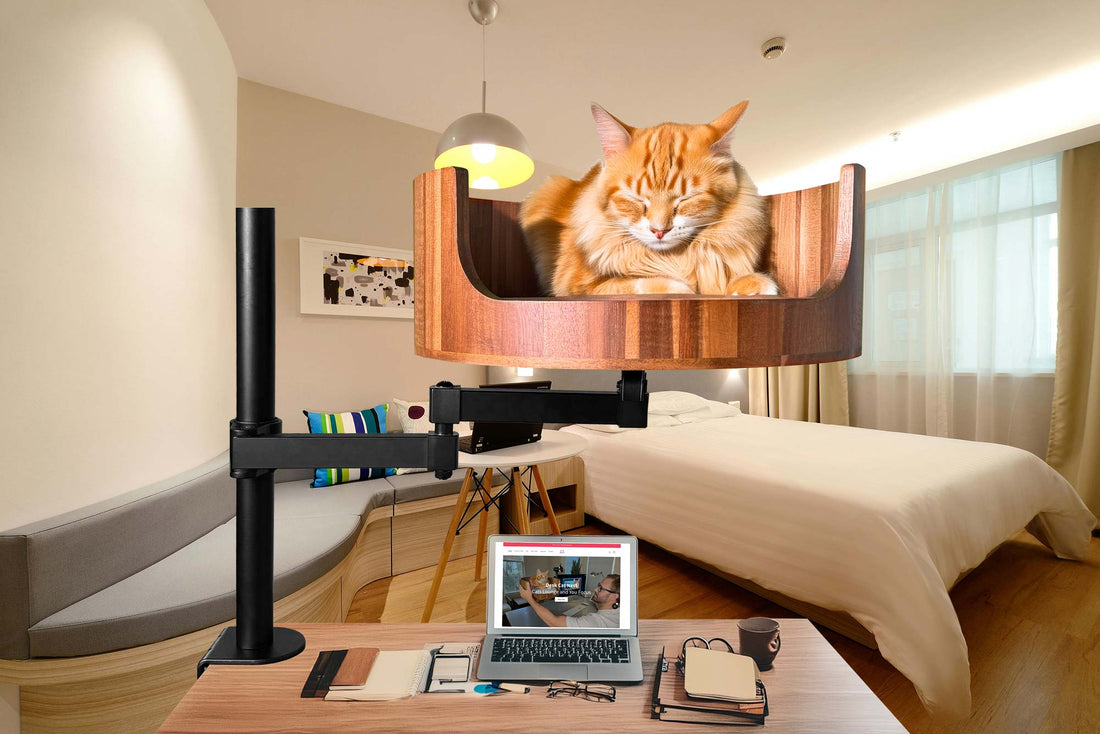
Why Does My Cat Cry at Night? Understanding Feline Behavior
Share
If you're a cat owner, you've probably experienced it at some point - the mysterious late-night cries and meows coming from your feline companion. But why does your cat cry at night? Understanding feline behavior can help shed light on this common issue that many cat owners face. From vocalization to potential medical concerns, there are a variety of reasons why your cat may be crying in the wee hours of the night.
In this article, we will explore the different reasons why your cat may be crying at night, and how you can better understand and address this behavior. From separation anxiety to attention-seeking behavior, we'll delve into the possible motivations behind your cat's nighttime cries. Additionally, we will discuss the importance of providing a comfortable and stimulating environment for your cat, including the benefits of a cozy Desk Cat Nest. By gaining insight into your cat's behavior and needs, you can help ensure a peaceful night's sleep for both you and your beloved pet.
1. Cats cry at night for various reasons including seeking attention, feeling anxious, or displaying territorial behavior.
2. Understanding your cat's individual needs and behavior patterns can help address nighttime crying.
3. Providing engaging activities and a comfortable sleeping environment can alleviate nighttime restlessness for your cat.
4. Regular playtime and creating a consistent bedtime routine can help establish a sense of security for your feline companion.
5. Consulting with a veterinarian or animal behaviorist can offer additional insights and recommendations for managing your cat's nighttime behavior.
Causes of Nighttime Crying in Cats
One common reason cats cry at night is because they are bored or seeking attention. Cats are nocturnal animals by nature and may become active during the night when their owners are trying to sleep. Additionally, medical issues such as pain, discomfort, or anxiety can also lead to nighttime crying in cats. It is important to observe your cat's behavior and consult with a veterinarian to rule out any underlying health issues.
Strategies to Address Nighttime Crying
There are several strategies that cat owners can implement to address nighttime crying in their feline companions. Providing interactive toys, engaging in play sessions before bedtime, and creating a comfortable sleeping environment can help alleviate boredom and reduce nighttime crying. Additionally, establishing a consistent feeding and playtime schedule can help regulate your cat's activity levels and reduce nighttime disturbances.
Case Study: Desk Cat Nest
In a recent case study, a cat owner noticed that their feline companion would cry at night and exhibit restless behavior. After consulting with a veterinarian, it was determined that the cat was experiencing anxiety due to a lack of designated resting area. The cat owner decided to create a cozy nest on their desk using a soft blanket and a few favorite toys. The cat immediately took to the new resting spot and stopped crying at night, leading to improved sleep for both the cat and the owner.
Conclusion
Understanding the reasons behind your cat's nighttime crying behavior is crucial in order to address and alleviate the issue. By observing your cat's behavior, providing a stimulating environment, and consulting with a veterinarian if needed, you can help your feline companion feel more comfortable and secure during the night. Remember that each cat is unique, so it may take some trial and error to find the right solution for your particular cat.
FAQs for Desk Cat Nest as a solution for why does my cat cry at night
How can a Desk Cat Nest help with my cat crying at night?
A Desk Cat Nest provides a cozy and comfortable spot for your cat to sleep in, which can help reduce stress and anxiety that may be causing them to cry at night. The enclosed design of the nest can also provide a sense of security for your cat, helping them feel safe and relaxed.
Is a Desk Cat Nest suitable for all cats?
While most cats enjoy the privacy and security of a Desk Cat Nest, every cat is different. Some cats may prefer open spaces or different types of beds. It's important to observe your cat's behavior and preferences to see if a Desk Cat Nest is the right fit for them.
How should I introduce my cat to a Desk Cat Nest?
It's best to place the Desk Cat Nest in a quiet and comfortable spot where your cat likes to spend time. You can encourage your cat to explore the nest by placing treats or toys inside. Be patient and allow your cat to get used to the nest at their own pace.
Can a Desk Cat Nest help with other behavioral issues?
While a Desk Cat Nest can provide a safe and comfortable space for your cat to relax, it may not necessarily solve all behavioral issues. It's important to address any underlying issues that may be causing your cat to cry at night, such as separation anxiety or health problems, in addition to providing a comfortable sleeping area.
In conclusion, providing your cat with a comfortable and cozy sleeping space like the Desk Cat Bed can greatly help alleviate nighttime crying. By offering a secure and inviting environment, your cat will feel safe and relaxed, leading to a more restful night's sleep for both you and your feline friend. The Desk Cat Bed's durable construction and plush cushioning provide the perfect combination of comfort and support, ensuring that your cat gets the quality rest they need. Invest in a Desk Cat Bed today to help address your cat's nighttime cries and promote overall well-being.



















































